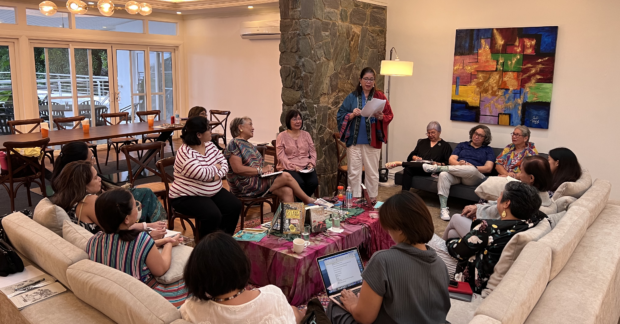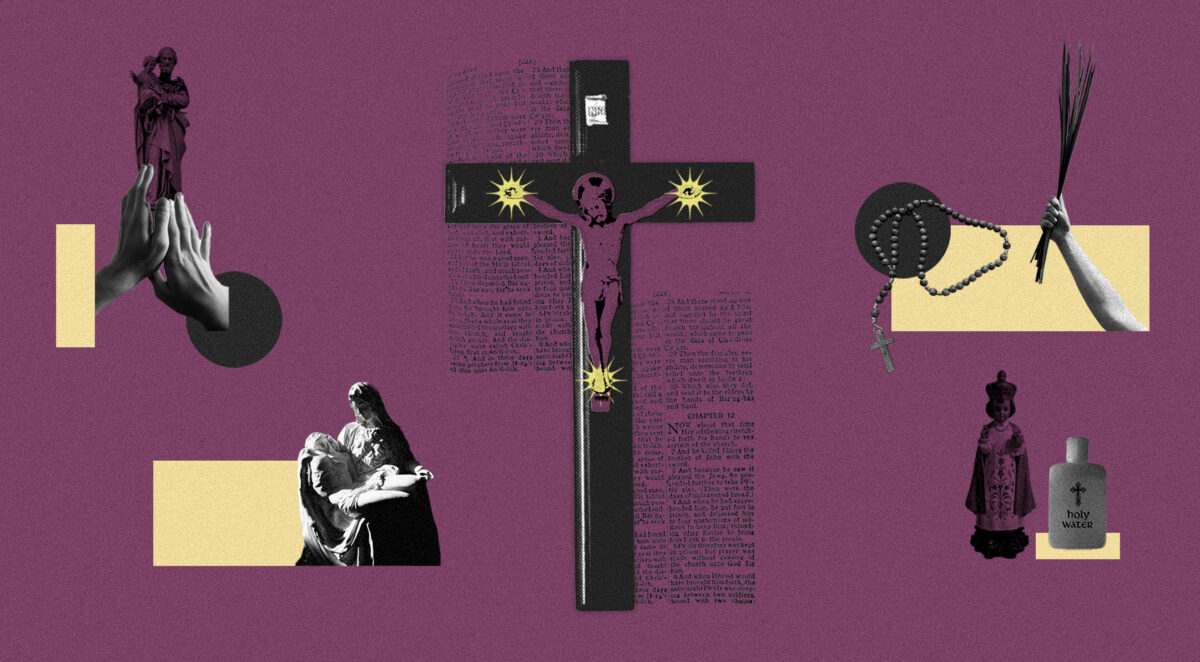
Amado Gabriel Esteban made news when he was named president of Seton Hall University in early 2011. He was the first Filipino to become president of a major American university and Seton Hall’s first lay president in decades, and only third in the Catholic institution’s 155-year history.
The news reached home not quite like Charice making it on “Oprah” or Manny Pacquiao after winning yet another boxing crown, but enough to generate a few e-mails from kababayans. Some were asking for jobs, others for tuition-fee discounts, Esteban recalled in amusement.
“So you can imagine if I had won the lottery,” said Esteban, 50, a soft-spoken man with the warm and easy manner of one’s favorite uncle. He and his wife, Josephine, were guests of honor at the Makati lunch this week hosted by Philippine Ambassador to the US Jose Cuisia Jr., and attended by top academics and Philippine university presidents. (Cuisia attended Esteban’s investiture.)
“I tried to be respectful and replied [to the e-mails],” Esteban said.
Meritocratic
If those kababayans knew him at all, they wouldn’t have even asked: The meritocratic Esteban is against unfair advantage. Hard work is his battle cry.
“I found out a long time ago that to be a leader and a manager, you learn to be fair to people,” he said. “Once people find that they can game the system, then they’ll game the system. That’s the major problem I see going on in corporations and even in some countries; people try to gain unfair advantage. While it shouldn’t be entirely black and white with your regulations, if you’re going into a gray area, there should be a strong justification. That’s one rule you learn being in public higher education in the US: Don’t do anything unless you’re perfectly comfortable that it’s not going to be in the next day’s paper. I tend to be very transparent.”
His insistence on hiring people based on merit and absolute objection to getting ahead using one’s personal connections is atypical in Filipino culture, where it’s not unusual for elected officials to appoint relatives to key positions.
“It’s hard to hire people you can’t trust. But trust works both ways,” Esteban said. “You have to be able to trust that they’ll watch your back. But watching your back means they’re going to be on the up and up when it comes to their decision-making. I can see that happening in some corporations. Even in the US, they hire [family] if they have the skills. But if they don’t have the skills, then you’re condemning the country.”
Career path
Born and raised in Manila, Esteban studied math and earned his MBA at the University of the Philippines, effectively eschewing what everyone thought would be his career path: to become a medical doctor like his father, who taught at De La Salle and UP College of Medicine (his siblings both became doctors).
It was at UP where he met Josephine King, a business economics major who, like him, was Catholic school-bred (he, at Paco Catholic School, where his mother taught history; she, at Siena College, where she sang in the glee club). Self-described geeks, they met in the math club.
Esteban went on to win a scholarship that brought him to Hawaii’s Chaminade University for his second master’s degree, in Japanese business studies, before coming home briefly to work as an investment analyst at San Miguel Corp. The Estebans moved to the US in 1988, where Josephine was offered an opportunity to earn an MBA at the University of California, Riverside. He also won a fellowship to get a PhD in business administration at University of California, Irvine.

With their young daughter Ysabella in tow, the family moved to Texas where Esteban taught marketing at the University of Houston-Victoria, then later to Arkansas, where he became professor and associate vice president of academic affairs at Arkansas Tech.
The Estebans settled in Arkansas the longest, living there for 12 years. Esteban became dean of the University of Central Arkansas’ College of Business and, later, the provost or chief academic officer.
Exception
Given his background in public higher education, Esteban was initially uninterested when he was offered the position of provost at Seton Hall, New Jersey’s oldest diocesan private institution with 10,000 students. He was interviewing for presidency of public universities.
Esteban served as Seton Hall provost for nearly three years before being named interim president in August 2010. After a long search, the university board made an exception of its 25-year rule that only priests can become president and named Esteban its 20th president in January 2011.
Esteban said moving to the US required a lot of adjustments, especially living in small towns in the south where there’s only a small percentage of Catholics, and very few Filipinos. But he and his wife purposely picked smaller places to raise their daughter, where “there’s a strong sense of community and strong family values,” hence their initial reluctance to move to the Northeast.
(Their daughter, now 21, grew up studious and prayerful, said the couple. She will graduate this spring from Seton Hall with a degree in biochemistry. She plans to go to medical school.)
Early on, the couple thought that if they’d end up in the New York area, they might as well move back to Manila because of the congestion. (They planned to come home in 1998, with Esteban interviewing for teaching positions here, but “the 1998 Asian financial crisis took care of that.”) “And now we’re living there. It’s funny how things turn out,” he said, shaking his head at the irony.
Good fit
But Seton Hall was indeed a good fit for Esteban in more ways than one. As a young man, he was a reluctant jock who turned down an opportunity to play basketball in the UP varsity team “because I wanted it to be known that I got in because I had brains,” he said with a chuckle. Seton Hall “being a Catholic university where basketball is probably the most popular sport alongside baseball is a dream come true for a Filipino—basketball and church.”
Esteban, however, hasn’t shot hoops in a long time, picking up golf a few years ago, which now comes in handy as his new post requires him to socialize with alumni and potential donors for his university. A large part of the job is raising funds, he said. Josephine has had to take time off from her work at a media-planning agency in Manhattan to be by his side.
“If I didn’t do that, I’d never see him,” she said. “I realized his career comes first before mine. There’s always family to hold on together, so I’m always ready to pack and leave. I’m pretty much flexible, I adjust quite easily to certain situations.”
“If you look at the Catholic intellectual tradition, a significant number of the great universities were Catholics, even in the US,” Esteban noted. “Catholic universities provided opportunities to groups that didn’t have access to higher education. Catholic higher education continues to be extremely relevant in the US if you look at the bigger Catholic institutions like Notre Dame, Georgetown and Boston College.”
Seton Hall, according to its president, is known for its business school, as well as its programs in diplomacy and international relations. Its nursing program is the oldest in the state.
Pinoy food
In the last few years, Esteban has been visiting his birth country quite more often, not just to satiate his cravings for Pinoy food—Max’s, Jollibee—and green mango shake, but more importantly, to initiate exchanges with local universities. On Friday, he also hosted a reception for Filipino students who took the SATs, the US college admissions test; Seton Hall, which has a large community of Filipino students, is offering scholarships to those who make it to the top 10-percent passing rate of the SATs.
“We’re at the point in our lives where we’re trying to give back,” he said, adding that that should be the goal of people who have made it.

There are a number of successful Filipino academics in the US, he said, naming a few: Dr. Luis Maria “Chito” Calingo, also a UP graduate, and now executive vice president and chief academic officer of Dominican University of California; Dr. Conrado Gempesaw from Ateneo de Davao, who holds a similar post at the Miami University of Ohio; Dr. Billy Soo, a close friend of the Estebans who chairs the Accounting Department of Boston College.
“Billy was one of the smart guys,” Esteban said of his friend who graduated summa cum laude from UP. Reading the Inquirer on the morning of this interview, he spotted the photo of a former classmate in the paper: Hans Sicat, the president of the Philippine Stock Exchange, whom, Josephine noted, must still remember her husband as “Boyet,” not as “Gabe,” as he is known in the US.
As for his own academic record: “I wasn’t the smartest at UP by a long shot,” Esteban said. “I wasn’t the smartest in the PhD program. But once I realized that, I thought, no one’s going to outwork me. I can’t control how much the Lord gave me in terms of natural intelligence. The one thing I can control is how many hours I put into something. You just give as much as you can. You won’t always be successful. You’ll fail quite a few times, but it’s not how many times you fall down, but how many times you pick yourself back up. Some of the most successful business people we have, you ask them and they probably failed in more than one venture. They start all over again.”
Hard work
When asked what Filipino attitude he thinks needs to be rectified in order to get the country out of its rut, he said: “There’s no substitute for hard work. We shouldn’t rely on shortcuts. Why was it that 40, 50 years ago, we were No. 2 in Asia—we had the natural resources, the manpower? Then there’s lack of discipline, which you see on the roads, the traffic. Filipinos are successful wherever they go. They take on two to three jobs, and make a name for themselves. It’s not easy, but they see a light at the end of the tunnel.”
Speaking to students at the start of each school year, Esteban reminds them to find their passion and “work at it so you become the best at it. The [financial] rewards may not follow but you’ll have a happy life, as long as you’re able to sustain yourself in a manner that you’re happy with. There’s more to life than money. I didn’t get into teaching for the money. I never thought I’d end up teaching.”













































